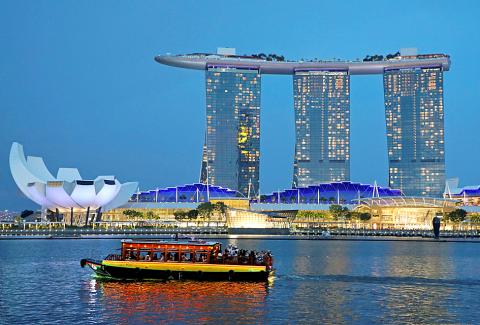Singaporean hotel occupancy rates have climbed to their highest level in more than a decade as travelers and business events switch from Hong Kong, where pro-democracy protests have slashed tourist numbers and negatively affected business sentiment.
Data released on Monday by the Singapore Tourism Board showed that average occupancy rates in the city-state’s hotels hit 93.8 percent in July, the highest level in records going back to 2005 and up from 92.5 percent last year.
The data also showed the highest revenue per room in almost four years, a trend analysts and hoteliers said was helped by conferences switching from rival business hub Hong Kong as protests that started in mid-June turned increasingly violent.

Photo: Reuters
“Singapore may benefit twice as much from the Hong Kong fallout as both these destinations share similar traits,” Singapore-based DBS Bank (星展銀行) analyst Derek Tan said, citing businesses switching conference venues from Hong Kong.
The Global Wellness Summit, a gathering of about 600 health and beauty industry delegates scheduled for the middle of next month is moving to Singapore from Hong Kong. The event’s spokeswoman said this was “to ensure travel is as seamless as possible.”
Fairmont Singapore and Swissotel The Stamford general manager Marcus Hanna said he had a 60-strong business group last month switch from Hong Kong for a five-night stay.
Hanna said his hotels, which offer conference and meeting facilities, have received a number of inquiries from companies looking to move events out of Hong Kong amid the unrest.
Jefferies analyst Krishna Guha said events in Hong Kong would have been a factor in lifting Singapore’s hospitality sector.
Revenue per available room, a key performance metric for the hotel industry, rose to S$203.70 (US$146.25) in July, its highest level since October 2015, and from S$200.20 in July last year.
He said the unrest would have weighed on tourists’ summer travel plans, while other factors included tightening hotel supply in Singapore during its peak season for North Asian visitors and a weaker Singapore dollar.
In Hong Kong, the territory’s airport has suffered repeated disruptions due to demonstrations, and hotel operators have reported lower occupancy rates and booking cancelations.
Many nations such as Singapore have advised their citizens to defer non-essential travel to the former British colony.
“The outlook remains bleak for September and the rest of the year for destination Hong Kong,” said Alicia Seah of travel agency Dynasty Travel, adding that inquiries and bookings have come to a “standstill” since last month’s airport shutdown. “There are now spillover effects ... with both leisure and business travelers opting to travel to Singapore instead of Hong Kong.”

SEEKING CLARITY: Washington should not adopt measures that create uncertainties for ‘existing semiconductor investments,’ TSMC said referring to its US$165 billion in the US Taiwan Semiconductor Manufacturing Co (TSMC, 台積電) told the US that any future tariffs on Taiwanese semiconductors could reduce demand for chips and derail its pledge to increase its investment in Arizona. “New import restrictions could jeopardize current US leadership in the competitive technology industry and create uncertainties for many committed semiconductor capital projects in the US, including TSMC Arizona’s significant investment plan in Phoenix,” the chipmaker wrote in a letter to the US Department of Commerce. TSMC issued the warning in response to a solicitation for comments by the department on a possible tariff on semiconductor imports by US President Donald Trump’s

The government has launched a three-pronged strategy to attract local and international talent, aiming to position Taiwan as a new global hub following Nvidia Corp’s announcement that it has chosen Taipei as the site of its Taiwan headquarters. Nvidia cofounder and CEO Jensen Huang (黃仁勳) on Monday last week announced during his keynote speech at the Computex trade show in Taipei that the Nvidia Constellation, the company’s planned Taiwan headquarters, would be located in the Beitou-Shilin Technology Park (北投士林科技園區) in Taipei. Huang’s decision to establish a base in Taiwan is “primarily due to Taiwan’s talent pool and its strength in the semiconductor

An earnings report from semiconductor giant and artificial intelligence (AI) bellwether Nvidia Corp takes center stage for Wall Street this week, as stocks hit a speed bump of worries over US federal deficits driving up Treasury yields. US equities pulled back last week after a torrid rally, as investors turned their attention to tax and spending legislation poised to swell the US government’s US$36 trillion in debt. Long-dated US Treasury yields rose amid the fiscal worries, with the 30-year yield topping 5 percent and hitting its highest level since late 2023. Stocks were dealt another blow on Friday when US President Donald

UNCERTAINTY: Investors remain worried that trade negotiations with Washington could go poorly, given Trump’s inconsistency on tariffs in his second term, experts said The consumer confidence index this month fell for a ninth consecutive month to its lowest level in 13 months, as global trade uncertainties and tariff risks cloud Taiwan’s economic outlook, a survey released yesterday by National Central University found. The biggest decline came from the timing for stock investments, which plunged 11.82 points to 26.82, underscoring bleak investor confidence, it said. “Although the TAIEX reclaimed the 21,000-point mark after the US and China agreed to bury the hatchet for 90 days, investors remain worried that the situation would turn sour later,” said Dachrahn Wu (吳大任), director of the university’s Research Center for